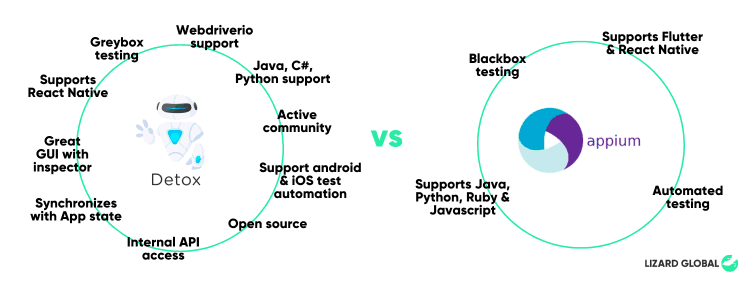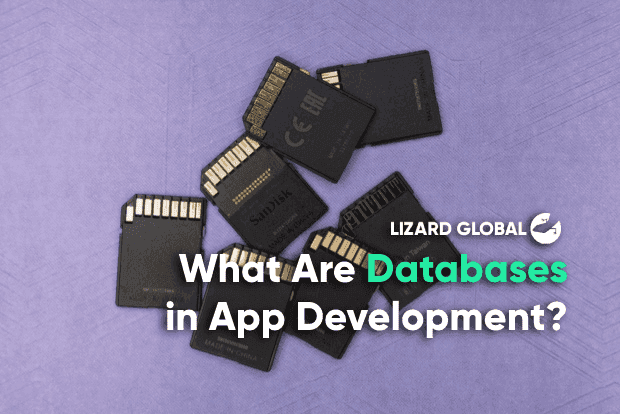software development
end to end testing
+ 8 more ...
Appium vs Detox: Which to Choose in 2023 (Pros & Cons!)

16 Jun 2023
by Kenny Liew, Senior Software Engineer & Asrul Ash

16 Jun 2023
by Kenny Liew, Senior Software Engineer & Asrul Ash
software development
end to end testing
E2E testing
mobile application
react native
automation
appium
detox
iOS
android
Appium vs Detox: Which to Choose in 2023 (Pros & Cons!)
Table of contents
Contact us
We will get back to you in the next 48 hours.

Both Detox & Appium are powerful and flexible testing frameworks to automate mobile apps on iOS and Android. But, what are their standout differences?
Follow Lizard Global on Facebook, Instagram, and LinkedIn.
Smartphone users have increased immensely during the past ten years. Americans now watch less television and more time on their mobile devices. In light of the fact that 21% of millennials open an app more than 50 times a day, it has been reported that mobile apps will earn $935 billion in revenue by 2023. Mobile apps account for 69% of all digital media time in the US alone. This shows how mobile apps predominate in a significant portion of people's daily lives. Therefore, creating an incredible mobile app experience is more than necessary. Apps must undergo extensive testing before being published to the appropriate app stores to guarantee that they function seamlessly on Android and iOS.
This article will go through the different E2E testing frameworks and how to choose the best mobile app automation testing frameworks that are frequently used to check an app's functioning before releasing it.
What is end-to-end testing with example?
is a type of software testing that verifies the functionality of an application from start to finish, simulating real-world scenarios to ensure that the application works as intended. End-to-end testing can involve testing multiple systems and integrations, including the user interface (UI), application programming interfaces (APIs), and back-end services.
Two popular end-to-end testing frameworks for mobile applications and more specifically for React Native are Detox and Appium. Both frameworks provide a way to automate interactions with a mobile application and verify that it behaves as expected from a user's perspective. So, in this article, we'll specifically compare Detox and Appium and discuss which framework might be the best choice for which scenario.

Appium vs Detox: What’s the difference?
Appium
Appium is a mature mobile testing framework that provides automated interactions with a mobile application on iOS and Android platforms, including web and hybrid applications. Appium allows the development team, specifically the developers, to automate interactions with the application at both the UI and API level. With these means, developers can concurrently test interactions between the app and back-end services.
Appium is best at testing across multiple devices and platforms, which is an important aspect of end-to-end testing. It provides a way to test the entire application, from the front-end user interface to the back-end services and integrations that support it, thus classing it as an end-to-end testing framework.
Appium is designed to be flexible and extensible, with a wide range of features and integrations. This leaves plenty of space and freedom for developers to customize the testing process to meet each specific need. It also supports extensive programming languages (Java, Python, Ruby, and JavaScript) and testing frameworks. Stand-out features such as test parallelization, device management, and reporting make E2E testings with Appium a lot more efficient and manageable.
Appium is known to be easy to learn. The tool has a large and active community of developers, and plenty of learning resources are made available on the Internet to learn about using the framework. This makes it easier to find help, share knowledge, and stay up-to-date with the latest developments in the framework.
Detox
Detox, developed by Wix, is a mobile testing framework designed for end-to-end testing of mobile applications built with React Native in mind, specifically on iOS and Android platforms. It allows you to simulate user interactions (UI) with a mobile application and verify the correct behaviors and functional requirements in a single go.
Detox is built on top of a popular test runner, Jest, which provides a powerful and flexible testing infrastructure. Detox provides a set of APIs that allow you to interact with a mobile application's UI and verify that the application behaves correctly. It supports running tests on both iOS and Android platforms and supports a variety of testing environments, including local development machines and cloud-based testing services.
Detox can be viewed as a gray box testing framework because it allows you to test an application's internal behavior and state in addition to the user interface (UI) interactions. Detox provides a rich set of APIs to interact with an application's internal state, allowing you to test aspects of the application that are not directly visible through the UI.
One of its unique features is its ability to synchronize with the application under test. This means the framework waits for the application to become idle before proceeding with the next test step, which can help prevent timing issues and flaky test results.

What's best for React Native: Detox or Appium?
Both Detox and Appium are powerful and flexible testing frameworks that allow the development team to automate mobile app testing on iOS and Android platforms. However, some key differences between these frameworks may make one a better choice for your testing needs. The obvious difference between Detox and Appium is their approach to testing.
Detox is optimized for testing React Native mobile applications and provides a set of APIs that are optimized for this purpose. It has auto-synchronization features which means tests become more reliable and faster as compared with Appium.
Appium, on the other hand, is a more general-purpose testing framework that can be used for end-to-end testing of mobile applications, including native, hybrid, and mobile web applications. It also has support for Flutter which is another popular cross-platform framework.
Ultimately, the choice between Detox and Appium depends on your specific testing needs and preferences. Developers should evaluate both options to gauge which mobile app automation E2E testing framework is the best fit for their testing requirements as both can be effective tools for automating mobile application testing. At Lizard Global, we use Detox as our preferred framework due to its robust features and seamless integration with our development workflow.
Need a hand?
With a mobile automated testing tool, you can test and release your app more quickly! Great expertise results from great dedication. Lizard Global is a group of enthusiastic web and mobile software developers. We assist our distinguished clients in leveraging technology to grow their businesses and create noteworthy goods. We've worked together with clients from all over the world (including the Netherlands, Malaysia, Singapore, Belgium, Australia, and more) to develop user-friendly iOS and Android mobile applications as well as eCommerce online applications.
Have a unique concept for a mobile application? Are you prepared to launch and disrupt the market? Get in touch with us right away, and we'll start working on your mobile application idea.


Both Detox & Appium are powerful and flexible testing frameworks to automate mobile apps on iOS and Android. But, what are their standout differences?
Follow Lizard Global on Facebook, Instagram, and LinkedIn.
Smartphone users have increased immensely during the past ten years. Americans now watch less television and more time on their mobile devices. In light of the fact that 21% of millennials open an app more than 50 times a day, it has been reported that mobile apps will earn $935 billion in revenue by 2023. Mobile apps account for 69% of all digital media time in the US alone. This shows how mobile apps predominate in a significant portion of people's daily lives. Therefore, creating an incredible mobile app experience is more than necessary. Apps must undergo extensive testing before being published to the appropriate app stores to guarantee that they function seamlessly on Android and iOS.
This article will go through the different E2E testing frameworks and how to choose the best mobile app automation testing frameworks that are frequently used to check an app's functioning before releasing it.
What is end-to-end testing with example?
is a type of software testing that verifies the functionality of an application from start to finish, simulating real-world scenarios to ensure that the application works as intended. End-to-end testing can involve testing multiple systems and integrations, including the user interface (UI), application programming interfaces (APIs), and back-end services.
Two popular end-to-end testing frameworks for mobile applications and more specifically for React Native are Detox and Appium. Both frameworks provide a way to automate interactions with a mobile application and verify that it behaves as expected from a user's perspective. So, in this article, we'll specifically compare Detox and Appium and discuss which framework might be the best choice for which scenario.

Appium vs Detox: What’s the difference?
Appium
Appium is a mature mobile testing framework that provides automated interactions with a mobile application on iOS and Android platforms, including web and hybrid applications. Appium allows the development team, specifically the developers, to automate interactions with the application at both the UI and API level. With these means, developers can concurrently test interactions between the app and back-end services.
Appium is best at testing across multiple devices and platforms, which is an important aspect of end-to-end testing. It provides a way to test the entire application, from the front-end user interface to the back-end services and integrations that support it, thus classing it as an end-to-end testing framework.
Appium is designed to be flexible and extensible, with a wide range of features and integrations. This leaves plenty of space and freedom for developers to customize the testing process to meet each specific need. It also supports extensive programming languages (Java, Python, Ruby, and JavaScript) and testing frameworks. Stand-out features such as test parallelization, device management, and reporting make E2E testings with Appium a lot more efficient and manageable.
Appium is known to be easy to learn. The tool has a large and active community of developers, and plenty of learning resources are made available on the Internet to learn about using the framework. This makes it easier to find help, share knowledge, and stay up-to-date with the latest developments in the framework.
Detox
Detox, developed by Wix, is a mobile testing framework designed for end-to-end testing of mobile applications built with React Native in mind, specifically on iOS and Android platforms. It allows you to simulate user interactions (UI) with a mobile application and verify the correct behaviors and functional requirements in a single go.
Detox is built on top of a popular test runner, Jest, which provides a powerful and flexible testing infrastructure. Detox provides a set of APIs that allow you to interact with a mobile application's UI and verify that the application behaves correctly. It supports running tests on both iOS and Android platforms and supports a variety of testing environments, including local development machines and cloud-based testing services.
Detox can be viewed as a gray box testing framework because it allows you to test an application's internal behavior and state in addition to the user interface (UI) interactions. Detox provides a rich set of APIs to interact with an application's internal state, allowing you to test aspects of the application that are not directly visible through the UI.
One of its unique features is its ability to synchronize with the application under test. This means the framework waits for the application to become idle before proceeding with the next test step, which can help prevent timing issues and flaky test results.

What's best for React Native: Detox or Appium?
Both Detox and Appium are powerful and flexible testing frameworks that allow the development team to automate mobile app testing on iOS and Android platforms. However, some key differences between these frameworks may make one a better choice for your testing needs. The obvious difference between Detox and Appium is their approach to testing.
Detox is optimized for testing React Native mobile applications and provides a set of APIs that are optimized for this purpose. It has auto-synchronization features which means tests become more reliable and faster as compared with Appium.
Appium, on the other hand, is a more general-purpose testing framework that can be used for end-to-end testing of mobile applications, including native, hybrid, and mobile web applications. It also has support for Flutter which is another popular cross-platform framework.
Ultimately, the choice between Detox and Appium depends on your specific testing needs and preferences. Developers should evaluate both options to gauge which mobile app automation E2E testing framework is the best fit for their testing requirements as both can be effective tools for automating mobile application testing. At Lizard Global, we use Detox as our preferred framework due to its robust features and seamless integration with our development workflow.
Need a hand?
With a mobile automated testing tool, you can test and release your app more quickly! Great expertise results from great dedication. Lizard Global is a group of enthusiastic web and mobile software developers. We assist our distinguished clients in leveraging technology to grow their businesses and create noteworthy goods. We've worked together with clients from all over the world (including the Netherlands, Malaysia, Singapore, Belgium, Australia, and more) to develop user-friendly iOS and Android mobile applications as well as eCommerce online applications.
Have a unique concept for a mobile application? Are you prepared to launch and disrupt the market? Get in touch with us right away, and we'll start working on your mobile application idea.

FAQs

Compared to Appium, is detox better?
Is React Native a front- or a back-end solution?
What exactly is automated testing in mobile applications?
What is a good example of end-to-end testing?







